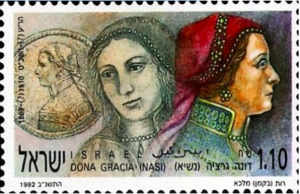By Gedaliah Borvick

JERUSALEM — My company’s Netanya maven, Ruthie Yudin, texted me from Dona Gracia Street in Netanya. Googling the street name, she was blown away by Ms. Gracia’s life, and wrote: “Her story must be told!”
Although streets in Tiberias and Haifa are also named in her memory, I was surprised that Dona Gracia’s accomplishments are unfamiliar to most people, as her biography reads like a best-selling novel, replete with espionage, adventure, intrigue, and high-stakes finances.
In the 16th century, Ms. Gracia, affectionately known as La Senora, was the richest Jew in the world. She viewed her financial strength as a responsibility, and expended considerable funds and leveraged her vast network of powerful connections to save thousands of persecuted Jews during the Inquisition. Let’s investigate the life and times of this heroic, trailblazing woman.
Dona Gracia Mendes was born in 1510, almost two decades after her family fled Spain to Portugal in 1492. Just a few years later, it was decreed in Portugal that all Jews should be expelled or forced to convert. These converts, who continued to practice Judaism secretly, became known as “Marrano Jews.”
At the age of 12, Dona’s parents revealed to her the family’s secret, and she began to learn Jewish customs. Six years later, she married her uncle Francisco Mendes, whose real name was Tzemach Benvenisti. He was born into an affluent family that dealt in silver, gems, and spices. In addition, the family’s Mendes Banking House was the world’s second largest bank, with branches in commerce hubs across the globe. Tzemach passed away nine years after they wed, and Dona Gracia, at the tender age of 27, was left with a huge fortune and a vast business empire.

Dona Gracia expanded the family’s trading enterprise and purchased a fleet of ships to distribute the spices. Her strategy to control the global movement of cargo was a precursor to Amazon, which came to the same realization and has acquired shipping companies and cargo planes.
Gracia’s activities were extremely unusual, as a woman living in the 16th century was only permitted to independently manage her life if she had the status of “widow.” Before marriage, a woman legally belonged to her father, and during marriage she belonged to her husband. This brilliant woman understandably was not going to relinquish her vision and control of her empire, and therefore never remarried.
During the Inquisition, a period infamous for the severity of its persecution of Jews and Muslims, Gracia was on the move for many years – residing in Portugal, London, Antwerp, Venice, Ferrara, and finally Istanbul – staying one step ahead of the authorities who wanted to confiscate her assets. Always focused on the community’s needs, Gracia operated an extensive network of agents who clandestinely aided the Marranos as they fled the Inquisition, and Bank Mendes’ global branches secretly assisted them to transfer money and not lose their assets.
In Ferrara, Gracia began to live a publicly Jewish life, and devoted significant time and resources to address the needs of the Jewish world. One interesting example of her creative generosity: with the invention of the printing press, she established printing houses that published the Bible and other holy books, as a corrective to the book burning of the Christian Inquisition.
A few years later, Ms. Gracia moved to Istanbul, where the Sultan welcomed the Jews and allowed the Marranos to practice Judaism openly. She began to be called by her Hebrew name, Hana Nasi, and opened synagogues and Jewish schools, and supported Jewish scholarship.
Towards the end of her life, Gracia appealed to the Sultan to lease her cities in Israel, and he consented to lease her family the city of Tiberias and several surrounding villages. She spent large sums of money to create a community, which served as a refuge for Jews who were persecuted in Spain and Portugal. Unfortunately, this project was short-lived, and the community petered out after only one generation.
Dona Gracia passed away in 1569 at the age of 59. Her life’s work underscored her courageous and inspirational devotion to Judaism, and her legendary personality epitomized triumph and hope over adversity and despair.
*
Gedaliah Borvick is the founder of My Israel Home (www.myisraelhome.com), a real estate agency focused on helping people from abroad buy and sell homes in Israel. To sign up for his monthly market updates, contact him at gborvick@gmail.com.